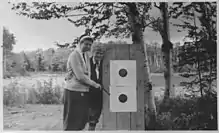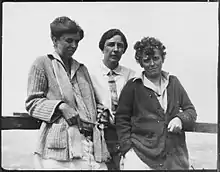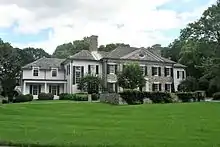Nancy Cook
Nancy Cook (August 26, 1884 – August 16, 1962) was an American suffragist, educator, political organizer, business woman, and friend of Eleanor Roosevelt. With her partner Marion Dickerman and Roosevelt, she was co-owner of Val-Kill Industries, the Women's Democratic News, and the Todhunter School.

Birth and early life
Born in Massena, New York she attended Syracuse University where she graduated with a bachelor's degree in arts in 1912.
Career

She taught first at Fulton, New York, where she taught art and handicrafts to high school students from 1913 to 1918. It was here that she met Syracuse classmate Marion Dickerman, who taught arts and handicrafts as well. These two women become lifelong partners, spending almost their entire adult lives together.
Her respect for Woodrow Wilson's vision overcame her strong antiwar sentiments and she and Dickerman both became active in the Red Cross. As Dickerman later recounted, they "really believed this was a war to end wars and make the world safe for democracy." In 1918, they both traveled to London to assist the women-staffed Endell Street Military Hospital and "scrub floors or perform whatever other chores were required." Cook would, with less than two weeks training, begin to make artificial limbs for soldiers that had lost an arm or a leg.
Cook, who had never felt teaching to be her element, was delighted when Harriet Hay Mills asked Cook if she would accept the position as executive secretary of the Women's Division of the State Democratic Committee, a post she would hold for nineteen years. She held key responsibility in Al Smith and Franklin Roosevelt's gubernatorial and presidential campaigns.
Cook and Dickerman became frequent guests of the Roosevelts. The three women, with FDR's encouragement, built Stone Cottage at Val-Kill, on the banks of the FallKill creek. Cook and Dickerman made this their home and Eleanor had her own room, although she rarely spent the night. Cook, an expert woodworker, made all furniture. Towels, linens, and various household items were monogrammed "EMN", using the three women's initials. In 1927, Cook helped start Val-Kill Industries, whose daily operations she would manage until the business closed in 1936.
Thrilled with FDR's victory, Cook and Dickerman found it difficult to understand Eleanor's anxiety over her role as first lady. When Val-Kill Industries dissolved in 1936, Eleanor moved out of the Stone Cottage and had the factory building remodeled.

Lorena Hickok took an active dislike to Dickerman and this started to unravel the relationship between the three. Dickerman and Cook continued to live in Stone Cottage until after Franklin D. Roosevelt's death in 1945. They sold all interest in the Val-Kill property to Eleanor in 1947 when they moved to New Canaan, Connecticut, where Dickerman became the educational programming director for the Marine Museum.
Cook lived there with Dickerman until her death and is buried next to Dickerman at Westfield Cemetery, Westfield, New York.
Val-Kill Industries
Founded in the 1920s by friends, Eleanor Roosevelt, Nancy Cook, Marion Dickerman, and Caroline O'Day. the industry working along the lines of producing furniture within the Colonial Revival Style that was sweeping through America in this time period. The women would create this industry to give jobs to those in need, mainly to immigrants, but also to farmers on their off-seasons as a means for them to support their families through the less profitable times of the year. They hoped this factory would be a haven for small-town peoples during off-seasons and would provide many full-time jobs to those in need. However, the industry would fail to survive during the Great Depression, closing due to setbacks and Eleanor's need to focus on her duties as First Lady. Val-Kill Industries was a glimpse of the hope people had to give full-time jobs to those families suffering in small town areas. [1]
References
- 1. Grieve, Victoria M. ""Work That Satisfies the Creative Instinct": Eleanor Roosevelt and the Arts and Crafts." Winterthur Portfolio 42, no. 2/3 (2008): 159-82
| Wikimedia Commons has media related to Nancy Cook. |
- Cook, Blanche Wiesen. Eleanor Roosevelt: Volume One, 1884-1933. New York: Viking Press, 1993
- Cook, Blanche Wiesen. Eleanor Roosevelt: Volume Two, 1933-1938. New York: Viking Press, 1999
- Davis, Kenneth. Invincible Summer: An Intimate Portrait of the Roosevelts Based on the Recollections of Marion Dickerman. New York: Atheneum Press, 1974
